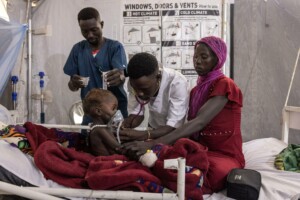Sudan, UNHCR and FAO to strengthen refugees’ self-reliance in eastern Sudan
The Food and Agriculture Organization of the United Nations (FAO) and the Office of the United Nations High Commissioner for Refugee (UNHCR) have agreed with the Government of Sudan, represented by the Commissioner for Refugees (COR), to launch a new project to enhance the resilience and self-reliance of refugees and asylum-seekers in Eastern Sudan through skills-building initiatives and sustainable rural livelihood strategies. The joint pilot project is designed to improve access to food and income opportunities for low-income households living in refugee camps in the region.
The Food and Agriculture Organization of the United Nations (FAO) and the Office of the United Nations High Commissioner for Refugee (UNHCR) have agreed with the Government of Sudan, represented by the Commissioner for Refugees (COR), to launch a new project to enhance the resilience and self-reliance of refugees and asylum-seekers in Eastern Sudan through skills-building initiatives and sustainable rural livelihood strategies. The joint pilot project is designed to improve access to food and income opportunities for low-income households living in refugee camps in the region.
The project will enable low-income households to meet local market needs by providing skills development in sustainable agriculture and livestock production. Hands-on training will be provided to refugees and asylum seekers in land preparation, production and harvesting processes for sorghum, sesame, horticulture, fodder and poultry, as well as production management, packaging and marketing best practices.
“This project comes at a critical time. Eastern Sudan is facing a protracted refugee situation that is characterised by limited humanitarian aid resources, a lack of livelihood supports and chronic poverty in the refugee camps there,” says Mr. Abdi Jama, the FAO Representative in Sudan.
“The project is an important component of FAO and UNHCR’s joint efforts on a renewed Self-Reliance Strategy to address the situation by enhancing economic self-reliance in order to reduce refugee aid dependency and promote a sustainable co-existence between the refugees and host communities in Eastern Sudan,” Mr. Jama continues.
Protracted refugee situation
Eastern Sudan presents a mixed scenario as it remains one of the most protracted refugee situations worldwide but also witnesses an ongoing influx of new arrivals with an average of 1,100 individuals per month being registered at the border entry points in Sudan so far in 2015. Since the 1960s, the semi-arid region has generously hosted more than 1.5 million refugees, while also being one of the poorest in Sudan according to a 2009 national poverty assessment.
Currently, there are more than 90,000 refugees living in the region’s nine active refugee camps and urban areas in Kassala, El Gezira and Gedaref states. The majority of refugees who are from a protracted caseload have lived in the region for up to 40 years, with close to 60 per cent of the camp population having been born in Sudan.
Nearly 50 per cent of refugees and asylum-seekers in Eastern Sudan are estimated to live in chronic poverty. UNHCR’s operation in Eastern Sudan is focusing on self-reliance in order to address the issue of refugee aid dependency of long-stayers and provide alternatives to onward movement of new arrivals who face serious protection risks such as human trafficking.
“Refugees are often seen as passive recipients of aid, and an economic burden to the host communities, but in reality, the refugee population is not homogeneous. Although in extreme poverty, some are ready to build on their livelihood assets. Through this project, UNHCR will look at each refugee carefully, and assure that the right assistance reaches the right persons, based on not only their vulnerabilities but also on the capabilities of each refugee.” says Mr. Mohammed Adar, the UNHCR Representative in Sudan.
Like their host communities with whom they have forged strong socio-economic ties, refugees and asylum-seekers face a number of common problems, including a lack of access to farming capital in terms of land, tools, equipment and the right technology, with agricultural production constrained by unreliable rainfall, land degradation, little access to water resources and limited knowledge of sustainable agriculture and livestock production best practices to overcome these challenges. Similarly, the lack of sustainable livelihood opportunities in Eastern Sudan is a contributing factor in pushing new arrivals to engage in onward movement.
Pilot phase
The new project is in a pilot phase from August to December 2015, and will target refugees and asylum-seekers living in the Fau 5, Kilo 26 and Um Gargour camps. Upon successful implementation of the pilot, should additional resource be available, the project can be replicated to other camps, as well as to the host communities, with a particular focus on the local value chain development and partnership with private sectors, to be jointly supported by FAO and UNHCR.
“FAO is well-placed to address the livelihood challenges that refugees and asylum seekers in the region face,” says Mr. Jama. “By providing people with the skills and tools they need to increase agricultural and livestock production, this project will benefit entire households and will help pave a way out of chronic poverty and steer these communities toward a more sustainable and healthful future.”
FAO has provided food security and livelihood supports to refugees and asylum-seekers in Sudan since 2006, with projects currently underway in White Nile and South Kordofan states to support South Sudanese arrivals. “With increasingly limited resources available, a strong collaboration and partnership among all the concerned parties towards a common objective will be more and more important in the East”, says Mr. Adar. “The pilot project is an important investment to show that the humanitarian assistance to the refugees, if provided correctly in good partnership with the Government and the right development partners, can positively contribute to the socioeconomic development in the region.”











 and then
and then